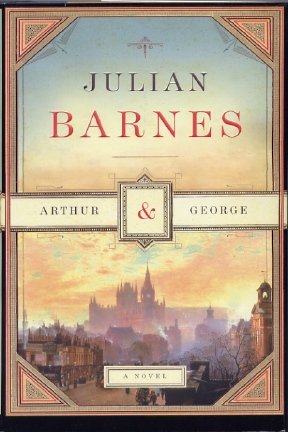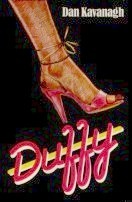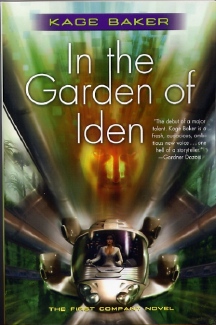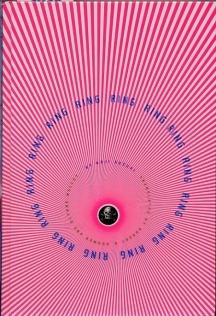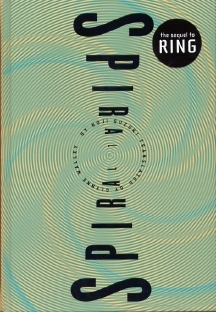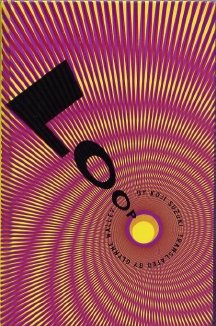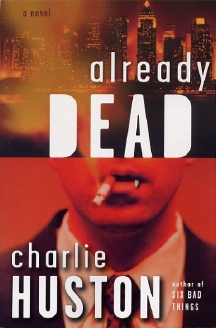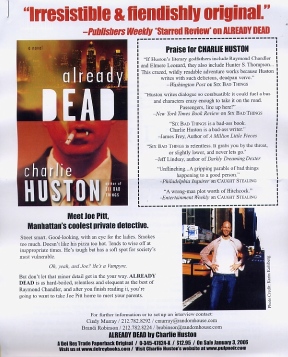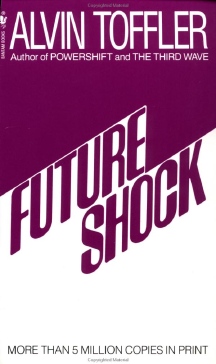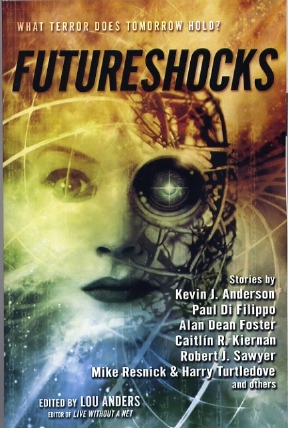|
|
|
This Just In...News from the Agony Column
|
01-06-06: Julian & Dan & 'Arthur & George' |
||||||
Watching
the Detectives
Of course, 'Arthur & George' was not the first time that Barnes was short-listed for a Booker. Barnes' third novel writing as Julian Barnes, 'Flaubert's Parrot' was nominated for a Booker Prize back in 1984, and he didn't win back then either. Yes, that's "as Julian Barnes." Barnes has been leading a double life as a writer from the beginning. He's never met Kavanagh. He is Kavanagh. Talking to David Streitfield back in 1989, Barnes described his Kavanagh novels as "a way of burning off excess energy -- a relaxation from the other writing." And wouldn’t it be a delicious irony were he to be remembered in some science fictional future, primarily for his detective novels, as has Doyle. It's rather unlikely though, as Barnes as forged a career as a literary author with a driving, intense vision that he executes with both passion and precision. 'Arthur & George' tells the stories of both Doyle and Edalji, slowly building up the backgrounds of both characters as he drives them towards their eventual meeting. Edalji, was a half-Scottish, half-Parsi solicitor who was tormented by the local coppers and eventually kitted up for a series of animal mutilations. Doyle found the case of interest and eventually helped to clear Edalji, in a case that led to the creation of England's Court of Appeal. Frankly, I don’t need to know much more to get myself to a bookstore. But should I care to know more, it's not like Barnes himself is particularly obscure. Nor is he the shy, retiring, artist type. Married to his agent, Pat Kavanagh, Barnes recent told the New York Times that, "I don’t read reviews. And I don’t ask for my sales figures." Good show, old chap! Those Booker nominations over the past twenty or more years, along with a Somerset Maugham award for first novel probably helped him get over the"worrying about whether I'm a good writer" aspect of his writing life. He also told the Times that he, "would have been happier if the story had come attached to Rudyard Kipling, who is a much greater writer." But he has an interesting take on Doyle. "He created a brilliant fantasy, which still holds us in its thrall. The fantasy is that a) a crime is solvable and b) it is solvable by intellectual deduction." Interesting words for a man who spent a bit of his life blowing off steam as a gritty mystery writer.
Interesting. Perhaps Kavanagh will return to write about his meeting with Lint back in the oh-so-wild 1980's. The question is, would the novel be science fiction? And would Julian Barnes be willing to even read science fiction -- let alone write it? One wonders if Barnes is blowing off steam writing SF these days, and under what name. Once you get into the business of fictionalizing authors' names and lives, it seems to take on a life of its own. |
|
01-05-06: Tor Puts Readers Back 'In the Garden of Iden' |
|||
Kage
Baker's First Novel Re-Released
The only teeny-tiny problem thus far has been this very serial nature. This is definitely not the kind of series where you are able to come into the middle. Each novel builds on the story in the previous novel, and this I know even though I've only read the first two novels. But back when the first novel in the series came out, she was with visionary (at the time) publisher Harcourt, Brace & Company. HB shelved its SF line after Baker's third novel, 'Mendoza in Hollywood', and subsequently the first and third novel in the series became difficult and expensive to get. Worry no more! If you're a latecomer like me, you can now score the entire series, read it and order, get in on the ground floor and enjoy the Baker's knockout story about meddling time-traveling immortal cyborgs. 'In the Garden of Iden' (Tor / Tom Doherty Associates ; January 6, 2006 ; $14.95) is now available in a wonderful, eminently readable trade paperback edition. The folks at Tor tell me that 'Sky Coyote', which is utterly, blissfully divine, is still in print from Eos. Now I'm not sure how "in print it is", but we'll take what we can get. And we're going to get a Tor TPB of the third novel, 'Mendoza in Hollywood' in May. Which means you can now have the whole set in Tor, with the exception of 'Sky Coyote'. Trust me, if you haven’t started this series, now is the time to do so. Baker's writing is lively, funny, involving and imaginative. Her premise combines a mystery as to what exactly is happening in the future and how it involves each individual adventure in the past. Her characters are utterly engaging. This is damn near a perfect series so far as I can tell. Tor has swatted the only fly in the ointment. Well, sort of. The whole 'Sky Coyote' is in print deal seems a bit dicey to me, but a quick check over at Bookfinder and even Amazon finds plenty of reasonable used copies. And sight of the row of books on my shelves has got me excited. Run, don’t walk. Once you get 'In the Garden of Iden', I'm guessing many readers of this column, who trend towards the compulsive will be willing to pay any price to find out what happens. It's worth any price, and frankly, I'd suggest having number two on hand even as you begin number one. |
|
01-04-06: Koji Suzuki Gets Into a 'Loop' |
|||||||||
J-Horror
or Just SF?
A quick glance over at the known-to-be-unreliable Wikipedia tells us that, "J-Horror is a term used to refer to Japanese contributions to horror fiction in popular culture." It adds: "J-horror tends to focus on the psychological fear factor and tension building (anticipation), particularly involving ghosts and poltergeist. (see psychological horror)...Many contain themes of folk religion such as: possession, exorcism, shamanism, precognition, and yokai." Any other online source tells me pretty much the same thing; same enough so that it looks copped from Wikipedia, which, from what I sense, is a pretty decent definition. I'll unilaterally declare it to be fine, and jump over the cliff into the abyss of speculative criticism. Of course, it doesn't mention starvation-thin pre-teen girls with menacing long, dark hair, or dripping water. But these constants have more to do with the American perception of J-Horror than the actuality. But even given the above rather expansive definition, I'd conclude that Suzuki does not really measure up. As much as we want this writer to be "the Japanese Stephen King" or even a decent written example of what's called J-Horror, I don’t think that's the case. Suzuki may have been adapted into the world of J-Horror, but the Ring Trilogy is pretty much pure science fiction.
'Spiral' is even more clearly science fiction, as Suzuki transforms his premise from the parapsychological to the medical. There's a nod to the emotional life of his protagonist, Ando, who is recovering from the death of a child. And yes, the child drowned, so there's this element of the dead wet kids who are literally the poster children for J-Horror. But there's nary a ghost or poltergeist here. Instead, we have a very clever, if over-the-top invasion theme in 'Spiral'. Bear in mind that this novel has no resemblance to any filmed version of 'Ring', and it's quite clear why this is so. 'Spiral' is a peculiar bit of science fiction that comes pretty close to being unfilmable -- or at least successfully unfilmable. And readers who are expecting subtle psychology will instead find medical horror so heavy-handed that it would give Michael Crichton a migraine. 'Spiral' is audacious and awe-inducing if you follow Suzuki's relentless logical vibe, but it can also be off-putting if you're looking for something that remotely resembles any work of J-Horror you've seen on the silver screen.
So, no, to my mind it's pretty clear that Koji Suzuki is more likely to be the Japanese Koji Suzuki than the Japanese Stephen King, and that while being the Japanese Koji Suzuki he'll show more influences from Stanislaw Lem than Stephen King. Suzuki doesn't really match up with any of the bullet points of J-Horror even if the adaptation of his work helped to define the genre. But this is certainly not the first time nor will it be the last that an author's work is adapted in such a manner that it eludes the point of the original while being a fine creation in its own right. Readers might remember that the science fiction and horror genres as we know them today first found expression in a single novel, that being 'Frankenstein' by Mary Shelley. Since then they've been dividing and colliding in the marketplace, alternately waves and particles, one, then the other. SF to horror and horror to SF. In a loop. |
New
Noir Bites Back
So who am I including in this roster of fury? Well, I'd say you'd pull in Richard Morgan, Adrian McKinty, Charlie Huston and Jon Courtenay Grimwood, all of whom have novels that feature a sort of bristling, in-your-face pissed off protagonist who is surely on the edge of life, either literally, in the case of Grimwood's '9Tail Fox' or Huston's 'Already Dead' or figuratively, in McKinty's 'Dead I May Well Be'. But behind all this you need a sort of slow-burning, self-effacing sense of humor, and a willingness to go right to the edge. And then over the edge. Now, Morgan goes over the edge science fictionally, killing then resurrecting his hard-boiled detective with the futuristic technology of 'Altered Carbon'. Grimwood does so both with alternate history and SF in his Arabesque trilogy; 'Pashazade', 'Effendi' and 'Felaheen', and he spins SF with the supernatural in '9Tail Fox'. McKinty goes over the edge with pure attitude in 'Dead I May Well Be' and 'Hidden River', and his upcoming sequel to 'Dead', 'The Dead Yard'. Huston followed the pure attitude path with 'Caught Stealing' and 'Six Bad Things', then decided to go the whole nine yards with 'Already Dead'. In case the fangs on the cover didn't register, there they are. That's not bad dental work. Joe Pitt, Huston's protagonist in 'Already Dead', is a vampire. And you can see the dollar signs reflected in the publisher's dead eyes in the glossy send-along that came with the book. Oh wait, I forgot. Huston's Pitt isn't a vampire, he's a Vampyre with a Y. And that's because he's got a Vyrus with a Y. Sheesh, you've really got to wear your bad attitude on your sleeve to do this new Noir thing, you know? Me, I find the Y-for-an-I substitution a bit poofy, sort of harkening back to interviews and all. But Huston proves right off the bat that he's no poofter, with rough and tumble prose that offers up the old dash-dialogue style. --You mean like this? You ask. --That's what I mean. Ain't it meaningful?
So he's not picky about what you call the book, so long as you read it. But his influences don't read like standard horror input. "Off the top of my head, Charles Bukowski, James Elroy and Cormac McCarthy have all put a stamp on my Henry Thompson books. With ALREADY DEAD I'm pretty consciously going for a Chandler thing." That's a pretty impressive feed line, if you ask me, and it just about shows up in the novel. Credit Del Rey for giving Huston a nice trade paperback, rope enough to hang himself and a few others with and credit Huston himself for wrapping up the first bit of this series in a mere 268 pages. Of course, he's already talking about the Henry Thompson books as a "trilogy" and 'Already Dead' as the first of Joe Pitt's "casebooks". Now there's a term that should catch your ears, if you've been reading your Encyclopedia of Victorian Fantastic Fiction. Casebooks are the original incarnation of mysteries back in the 1850's, coming out of the first round of true detective magazines. And if Huston is willing to boil his stuff down that that level, well, I'm inclined to give him an ear. Though not, as he'd probably prefer, in a brown paper bag. |
||||||
| Catch
the Trailing Edge of Technology I love new technology, but I have a very inconsistent attitude towards what I buy and do. I am chock full o' contradictory opinions and actions. For example, in general I find it anathema to buy the first iteration of any product. From my time in high tech, I know that the V1 is usually pretty buggy and prone to embarrassing mechanical and design failures. Yet I was champing at the bit to buy the computer I've run this website on for the past three years, an Apple 17" Powerbook that has been utterly rock-solid reliable. I started writing this website just as the practice of "blogging" was catching on, but never really have treated it as a blog. Nor have I used any of the popular blogging software, relying instead first on Claris Home Page, and now on (a downrev version of) Dreamweaver. Obviously, fancy design has never got in the way of producing content. A while back one of my readers, a very gracious lady, pleaded with me to start podcasting the interviews. She even helped me debug the file format, and for the past month and a half, I've been coding an enormous first upload. That's now done, and I've set it up and tested it using iTunes. It seems to work just as I'd expect, so point your browser here: http://www.trashotron.com/agony/indexes/tac_podcast.xml One of the reasons I've done this is that I have a huge backlog of older interviews that have never made it up, so I'd like to start releasing those at the rate of at least once a week. Moreover, I'm learning quite a bit from my NPR production duties. You can expect, I hope, more material on NPR, but also more NPR news report style material here. I'm going to start podcasting the news itself, and we'll see how much of a demand there is for it. If readers are interested, I could probably put together an audio version of what you read daily. Please email me and tell me what you'd most prefer. Also, I'm going to be doing more interviews in the upcoming year, and I'd like to get them out to you in a timely manner. Tomorrow look for the first of many interviews to be podcast. Now, as to the upload I've prepared today. It includes every interview for which I currently have an MP3 file, including the two generously donated by my fellow Fine Print interviewer Jenn Ramage. That means when you connect, you'll be asked if you want to download a lot of interviews. In iTunes, at least, you can specify which you want to download. The first time you bring up the link, you have to kind of turn it off, then you can browse and see what you want to bring in. The update date is currently set to January 2, 2006, 19:00. All I have or use is iTunes; but that information may prove useful for folks using other collectors, or so I'm told. If anyone else is using some other collector and sees problems or has suggestions, email me and I'll respond by fixing, or post your suggestions in a follow-up article. Everybody is at home today, so it's not really possible for me to produce a newscast. I'll try to have one done tomorrow and see if there's a demand from the readers and potential listeners. Now it's on to the news, and more reading to catch up with this utterly wonderful Christopher Fowler series. Then I'm back hot and heavy, so look out readers. I'm in the process of transforming you into listeners. I'm dragging and lagging at a point where I'm quite happy to remain, the trailing edge of low-cost high tech. Updated: Readers/listeners; I tried to record a news broadcast for the morrow, but my voice is still pretty shot from this cold/flu/viral attack. Those who are really interested, email me and I'll send you the MP3. But otherwise, I'd prefer to get back into working order before doing radio. Trust me, I need to, I sound pretty deathly, and in this case, at least, that's not my intention. |
|
01-02-06: From 'Future Shock' to 'Futureshocks' |
||||||
Roc's (and my) Pyrrhic Victory
The thought is that if we know what to be afraid of, perhaps we can prepare for it; perhaps we can prevent it. That rarely seems to be the case; or conversely, perhaps all our preparations are not for nought, that we're so right-on, we never even experience the horrors we dream of. Instead, the world seems to manufacture summat we can't foresee, and so, the shocks keep on coming. As do the visions of things which we suspect will shock us. Horror and Science Fiction often seem to want a wall between them as durable as that between Church and State, and indeed they seem to get one every bit as porous. Church (Horror) wants us to fear our own desires. State (Science Fiction) wants us to fear our own creations. Together, they just want to scare us into inaction, or rather, sitting around reading about other people acting. That seems safer for all involved to the Powers That Be, but it presumes that reading is Safe. Readers know that's not the case. Reading at its best is deeply disturbing. Take an example from the past, Alvin Toffler's 'Future Shock'. The premise of this non-fiction work was that we were the authors of our own undoing. Busy humans, inventing, writing, building, were inflicting change en masse that individuals could not psychologically or physically tolerate. And here we are some thirty years later, with a spiffy new hardcover edition of that famous book, wondering if "global warming" is real. Well, at least some of us are arguing it isn’t. Toffler correctly identified for the masses that the mind boggles, something science fiction writers and readers already knew. But we're no longer worried about the pace of change. Everybody knows that things change faster, and we're accustomed to that pace of change. Frankly, we all too busy dealing with the results of that change to waste any time worrying about the pace. Still, Toffler's 'Future Shock' did galvanize the popular culture of the times, and helped to usher in an acceptance of the importance of speculative thought, whether it be in the realm of fact, with works such as Toffler's, or fiction, with works like 'The Andromeda Strain'. Starting in the late 1960's with the vacuumed-clean vision of '2001' and culminating in the filthy future of 'Blade Runner' in 1982, readers of science fiction saw the visions they had been experiencing in print brought forth to the movie-going masses in a culture-changing acceptance of change itself. Of course, our visions of the future are now hyper-accelerated. To my mind, we expect change faster than it actually comes. We're all past future shock. As a culture, we're suffering from post-visionary traumatic stress syndrome. We've seen so many apocalypses that they're getting to be a bit of a yawner. That's why, I suspect, that the urgent warnings we're getting from SF authors and even mainstream personalities like Ray Kurzweil about the upcoming 'Singularity' are being greeted with such aplomb. Sure, we say. It's just another annoying OS upgrade. Call me when you get one that actually works. Until then, I'll stick with what I'm using. And until then, readers can comfort themselves with that seemingly unique hybrid of Church and State, er SF & horror, imaginatively dubbed SF Horror. As if they ever were separate. I mean, come on, folks. The first major SF novel and the first major horror fiction novel were on in the same, Mary Shelley's 'Frankenstein', and it partook equally of graveyard ghoullery and techno-handwaving. And to attest to its primal power, heck, to me some 189 years later, the whole idea of re-animating body parts with electricity still makes sense. I mean, these days we put what you might reasonably call Frankenstein resuscitators in airports and dub them paddles. SF has always partaken of horror and horror has always partaken of SF. You call them ghosts; I'll call them post-animate images. We'll meet over by the Neal Asher novels and read about monsters, OK?
Every author in this anthology has offered up excellent fiction. I'm always excited to see a collection that includes writers as diverse as John Meaney and Caitlin R. Kiernan, featuring a collaboration between Mike Resnick and Harry Turtledove, and finishing up with Robert Charles Wilson. You get the well-known on this side of the pond -- Alan Dean Foster and Kevin J. Anderson -- and the obscure but brilliant Adam Roberts. You certainly don’t need me to list out everyone here. You can be certain that the stories here are truly disturbing, but in a manner that is somehow comforting. Can you live with or in disturbed comfort? It seems that it's something we're learning to master, day in day out. Till death strikes "disturbed" from the tagline and leaves us in eternal comfort. You're living in the twenty-first century, and there's plenty to be scared about. Forget disease, terrorism, and technology. Heck, if you're struck down by any of those oh-so publicized objects of fear-mongering, you'll be lucky. Your story might pop up on one of the networks, in the papers. You'll escape what constant bombardment by the media says is your most likely and most unpleasant fate: Oblivion. But that escape is all too unlikely. No, you'd best head down to your local independent bookseller. There aren't that many left, are there, and it's getting harder and harder to justify going there. So easy, is it not, to just go online and buy what you want from the giants. So easy to save a few bucks and go to the so-called superstores. But today you don’t succumb, and in person, sweaty human to sweaty human, you hand over your debit card to buy this book, Futureshocks. (The whole poisoned dollars fiasco pretty much put a convenient end to real currency, didn't it?) The online guy you read, he said you’d enjoy it; it would help you escape from the actualities of your life. For those few hours, you can go somewhere else, somewhere in a future that promises to be worse than the one you expect to live through. Do expect stories about cyberhorrors grand and small. Don't expect stories about the vanishing middle class. That's something you'll get to live out, second by agonizing second. Nobody needs to foresee what's actually transpiring, and were one to do so, nobody would be thrilled to read about it. No, this little story is your horror story, and thank the Powers That Be it's essentially unpublished, only a couple of paragraphs long. Nobody will read it, and nobody will know about it except those who live it. And like most horror stories, though it will offer glimpses of just how awful things are -- you'll have to earn the money that pays for the book -- it will end happily. Your life is not likely to undergo any grand changes. If you're lucky, you'll get eaten by some techno-monster, blowed up by some techo-terrorists. But most of us aren't that lucky. Oblivion is our fate. But at least you can mitigate that oblivion. You bought that book the guy suggested, Futureshocks. You’re reading it, and none of the awful things in it will happen to you. No, only your life will happen. Open up Futureshocks and prepare to be comforted. What should we fear? it asks, and the answers are comfortably disturbing. When you finish the book, you're shocked all right. The stories are gone, but you're still here, and you realize that is what you fear, that is what is worth fearing. This is your Happy Oblivion. |
